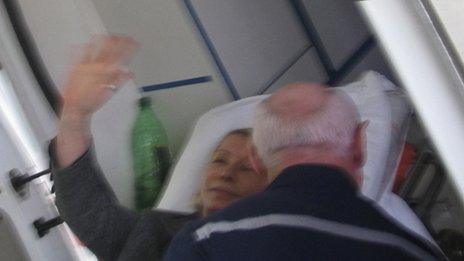Tymoshenko case: Europe pressure on Ukraine intensifies
- Published
- comments
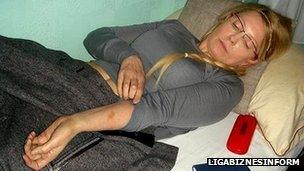
Several images of Ms Tymoshenko show bruising on her body
Several European leaders have cancelled visits to Ukraine amid growing concern over alleged mistreatment of the jailed opposition leader Yulia Tymoshenko.
Both EU Commission President Jose Manuel Barroso and Justice Commissioner Viviane Reding will boycott the Euro 2012 tournament in Ukraine.
German Chancellor Angela Merkel may do so too. A spokesman said any such visit would depend on Ms Tymoshenko's fate.
Five European presidents are avoiding a summit next month in Yalta, Ukraine.
A Ukrainian foreign ministry spokesman said the presidents of Austria, the Czech Republic, Germany, Italy and Slovenia would not attend the Yalta summit of Central and East European leaders on 11-12 May.
"We're announcing it beforehand, so that nobody makes any sensation out of it. There is no reason for seeing a [diplomatic] protest behind it," spokesman Oleg Voloshin said.
Earlier, German Environment Minister Norbert Roettgen said the Berlin government should stay away from Ukraine during Euro 2012, which Ukraine is co-hosting with Poland in June-July.
Ms Tymoshenko is reported to be on hunger strike and says she is very ill.
On Friday images appeared showing bruises on her body, which she says prison guards inflicted. She is being held in Kharkiv, eastern Ukraine.
An official in the Ukraine Prosecutor's Office, Vadim Goran, denied her allegation, saying the bruises came from "pushing against blunt, hard objects, or banging into them" and "in no way resulted from a punch to the stomach as she says".
After seeing the photos Sweden's Foreign Ministry summoned the Ukrainian ambassador and demanded an explanation.
Ms Tymoshenko, a former prime minister and key rival of Ukraine's President Viktor Yanukovych, is serving a seven-year jail sentence for abuse of office and faces another trial on tax evasion charges.
The new trial has been delayed until late May because she is refusing to attend on health grounds. She accuses Mr Yanukovych of exacting political revenge on her.
The authorities have denied her request to be treated abroad. She is said to have been suffering months of back pain and is reported to have been diagnosed with a herniated spinal disc.
Mr Roettgen, quoted by Germany's Bild newspaper, said the Ukrainian "dictatorship" must not be allowed to exploit Euro 2012 for its own benefit.
"That's why I think visits by ministers and prime ministers to Euro 2012 are out of the question in current circumstances," he said.
The German team will play the Netherlands in Kharkiv on 13 June. The tournament runs from 8 June to 1 July.
'Cold War' boycott?
Germany's Social Democrat opposition leader Sigmar Gabriel also called for a boycott.
EU Justice Commissioner, Viviane Reding, said she would boycott Ukraine's opening ceremony for Euro 2012 because "you cannot close your eyes on human rights, even during a great sporting celebration".
Ukraine's foreign ministry says it hopes the reports about Germany considering a boycott of Euro 2012 are just "a press canard".
"We would not like to think that the political leaders of Germany are capable of reviving the methods of the Cold War and making sport a hostage of politics," spokesman Oleg Voloshin said.
In another blow to Ukraine's image abroad the eastern city of Dnipropetrovsk - not one of the Euro 2012 venues - suffered four bomb blasts on Friday, which injured 27 people.
The authorities believe the attack - described as "terrorism" - was linked to a similar bomb blast in the city last November, in which the device was also placed in a rubbish bin.
Police have released photofit images of three suspects wanted in connection with Friday's attack.
Fourteen victims remain in hospital in the city, two in a serious condition, Interfax-Ukraine news agency reports.
- Published28 April 2012
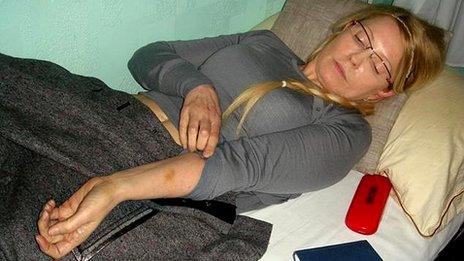
- Published26 April 2012
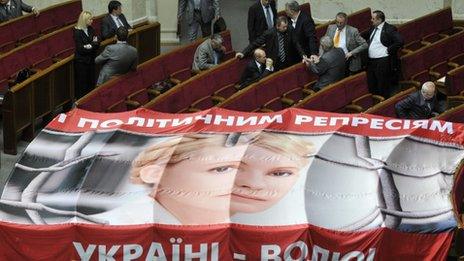
- Published23 May 2014
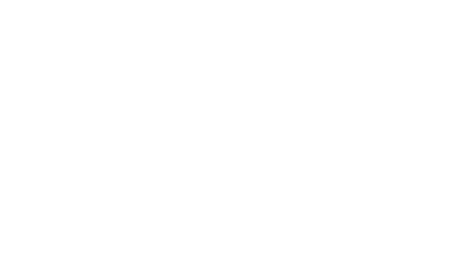
- Published25 April 2012
